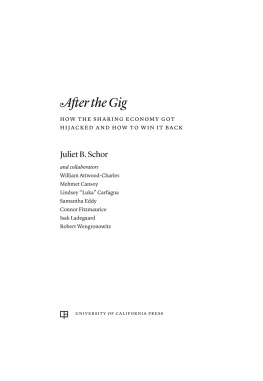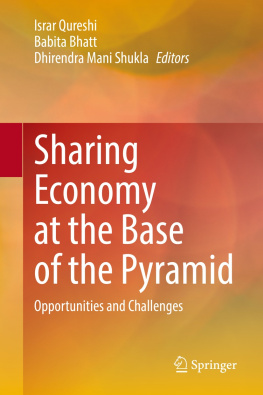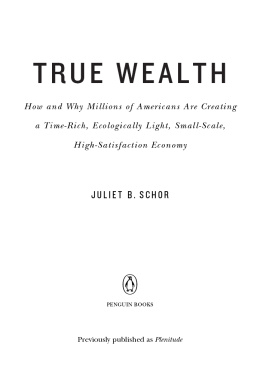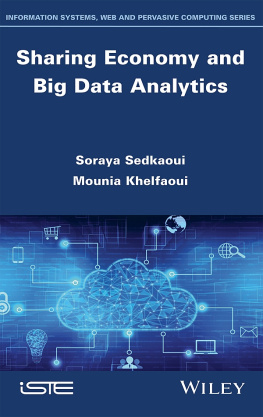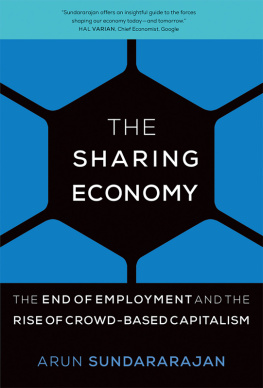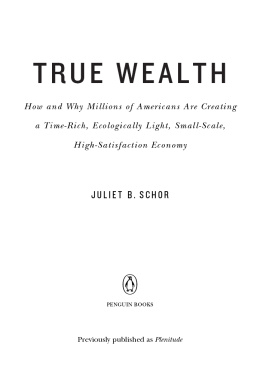Juliet Schor - After the Gig: How the Sharing Economy Got Hijacked and How to Win It Back
Here you can read online Juliet Schor - After the Gig: How the Sharing Economy Got Hijacked and How to Win It Back full text of the book (entire story) in english for free. Download pdf and epub, get meaning, cover and reviews about this ebook. year: 2020, publisher: University of California Press, genre: Politics. Description of the work, (preface) as well as reviews are available. Best literature library LitArk.com created for fans of good reading and offers a wide selection of genres:
Romance novel
Science fiction
Adventure
Detective
Science
History
Home and family
Prose
Art
Politics
Computer
Non-fiction
Religion
Business
Children
Humor
Choose a favorite category and find really read worthwhile books. Enjoy immersion in the world of imagination, feel the emotions of the characters or learn something new for yourself, make an fascinating discovery.
- Book:After the Gig: How the Sharing Economy Got Hijacked and How to Win It Back
- Author:
- Publisher:University of California Press
- Genre:
- Year:2020
- Rating:5 / 5
- Favourites:Add to favourites
- Your mark:
- 100
- 1
- 2
- 3
- 4
- 5
After the Gig: How the Sharing Economy Got Hijacked and How to Win It Back: summary, description and annotation
We offer to read an annotation, description, summary or preface (depends on what the author of the book "After the Gig: How the Sharing Economy Got Hijacked and How to Win It Back" wrote himself). If you haven't found the necessary information about the book — write in the comments, we will try to find it.
Juliet Schor: author's other books
Who wrote After the Gig: How the Sharing Economy Got Hijacked and How to Win It Back? Find out the surname, the name of the author of the book and a list of all author's works by series.
After the Gig: How the Sharing Economy Got Hijacked and How to Win It Back — read online for free the complete book (whole text) full work
Below is the text of the book, divided by pages. System saving the place of the last page read, allows you to conveniently read the book "After the Gig: How the Sharing Economy Got Hijacked and How to Win It Back" online for free, without having to search again every time where you left off. Put a bookmark, and you can go to the page where you finished reading at any time.
Font size:
Interval:
Bookmark:

Juliet B. Schor and her team have created the most comprehensive and indepth account of the sharing or gig economy. This book tells the story of how and why this troubling, insecure model of work attracted so much investment, so many workers, and so many customers.
SIVA VAIDHYANATHAN , author of The Googlization of Everything: (And Why We Should Worry)
Before the pandemic, the gig economy was structurally racist, ecologically destructive, and profoundly exploitative. Theres every danger that the reconstruction will be worse. Yet this nuanced and sophisticated study also shows, through the analysis of gig economy workers themselves, that flexibility, a shared sense of purpose, and a commitment to sharing more is well within our grasp. As we turn to imagine what kind of economy and society we want after COVID-19, the work of Schor and her students will be indispensable.
RAJ PATEL , Research Professor, Lyndon B. Johnson School of Public Affairs at the University of Texas at Austin, and author of A History of the World in Seven Cheap Things
While others have batted around the gig economy with melodrama and polemic, Schor comes to the subject with incisive, challenging questions for both the alarm raisers and the boosters. As a partisan in these debates myself, Ive trusted no scholar as much as Schor to keep me honest.
NATHAN SCHNEIDER , author of Everything for Everyone: The Radical Tradition That Is Shaping the Next Economy
Named in remembrance of the onetime Antioch Review editor and longtime Bay Area resident,
the Lawrence Grauman, Jr. Fund
supports books that address a wide range of human rights, free speech, and social justice issues.
The publisher and the University of California Press Foundation gratefully acknowledge the generous support of the Lawrence Grauman, Jr. Fund.
Juliet B. Schor
and collaborators
William Attwood-Charles
Mehmet Cansoy
Lindsey Luka Carfagna
Samantha Eddy
Connor Fitzmaurice
Isak Ladegaard
Robert Wengronowitz

UNIVERSITY OF CALIFORNIA PRESS
University of California Press
Oakland, California
2020 by Juliet B. Schor
Library of Congress Cataloging-in-Publication Data
Names: Schor, Juliet, author.
Title: After the gig : how the sharing economy got hijacked and how to win it back / Juliet B. Schor with William Attwood-Charles, Mehmet Cansoy, Lindsey "Luka" Carfagna, Samantha Eddy, Connor Fitzmaurice, Isak Ladegaard, Robert Wengronowitz.
Description: Oakland, California : University of California Press, [2020] | Includes bibliographical references and index.
Identifiers: LCCN 2020001754 (print) | LCCN 2020001755 (ebook) | ISBN 9780520325050 (hardback) | ISBN 9780520974227 (epub)
Subjects: LCSH : Precarious employmentCase studies. | Self-employedCase studies. | Cooperation. | SharingEconomic aspects.
Classification: LCC HD 5706 .S314 2020 (print) | LCC HD 5706 (ebook) | DDC 331.25/729dc23
LC record available at https://lccn.loc.gov/2020001754
LC ebook record available at https://lccn.loc.gov/2020001755
Manufactured in the United States of America
29 28 27 26 25 24 23 22 21 20
10 9 8 7 6 5 4 3 2 1
For Krishna and Sulakshana
The research team and I have incurred many debts in the almost ten years since we began this project. First and foremost we would like to thank the John D. and Catherine T. MacArthur Foundation, which generously supported our research through the Connected Learning Research Network. We are deeply grateful to the convener, Mizuko Ito, and to our colleagues in the networkJean Rhodes, Sonia Livingstone, Craig Watkins, Dalton Conley, William Penuel, Kris Gutierrez, Vera Michalchik, Katie Salen Tekinba, Amanda Wortman, Julian Sefton-Green, Richard Arum, Kylie Peppler, Ben Kirschner, and Nichole Pinkhard. They provided years of intellectual engagement, suggestions for our research, and friendship. From the Foundation, we thank Connie Yowell, Julia Stasch, and Jennifer Humke. At Irvine, Courtney Santos and Anita Centeno were always helpful. For me, the network was an entre into the study of digital technology and social life that has been enormously stimulating.
At Boston College, our work has been graciously supported by department chairs Sarah Babb and Andrew Jorgenson, Dean Gregory Kalscheur, and Provost David Quigley. I am grateful to them, as well as to my colleagues in the sociology department and the grants office. I would also like to thank the Radcliffe Institute for Advanced Studies, where I had the privilege of being a fellow in 201415. It was a highly productive year, and we had a great cohort. I enjoyed being back at Harvard and am especially grateful for the opportunity to spend time with Judith Vichniac, the fellowship director, and an old friend.
The team benefited from the work of many undergraduates, some of whom took on important parts of the research, including interviewing and coding. We would like to thank Abigail Letak, Alison Wawrzynek, Alex Moscovitz, Lea Oriol, Hahnsol Kang, Elizabeth Jiang, Nathan Schwan, Carolyn Ruh, Cristina Zubizaretta, Alison Grewe, Gloria Kostadinova, John Deacon, Sergio Farina, and Michael Griglak. Your contributions were invaluable.
Because this is a new area of study, I have had the privilege of being at a number of early scholarly gatherings. At each of these I met scholars whose research I already admired, and I was introduced to new people and their work. One of these workshops was the First International Workshop on the Sharing Economy organized by Koen Frenken at Utrecht University in 2015. In 2016 Kathleen Thelen and Peter Hall organized a Radcliffe Ventures meeting on the Politics of Work and Welfare in the Platform Economy, which significantly expanded my understanding of the sector. A third was the Sharing Cities Summit in Barcelona. Most recently, it has been a privilege to participate in the Political Economy and Justice Workshop at the Safra Center for Ethics at Harvard, organized by Danielle Allen, Yochai Benkler, and Rebecca Henderson. Many thanks to all the participants in those gatherings.
I have presented this research to colleagues at many universities and conferences, where I received valuable feedback and encouragement. I am grateful to participants in seminars and workshops at Harvard, Harvard Business School, the Berkman Center, MIT, Northwestern, Boston College, Bentley University, Microsoft Research, Berkeley, Barnard College, New York University, Michigan, Rhode Island School of Design, Brown University, Boston University, CUNY Graduate Center, Connecticut College, University of Toronto, University of Massachusetts, Northeastern University, New School for Social Research, University of Maine, University of Central Arkansas, Tellus Institute, Utrecht University, Hamburg University, and University of Paris-Dauphine. I also presented our work at a variety of institutions and conferences, including the Annual meetings of the American Sociological Association, the Eastern Sociological Society, the American Anthropological Association, and the Society for the Advancement of Socio-Economics. I presented to the National Economic Council of the White House, the European Commission in Brussels, a joint workshop of the Royal Society and the American Academy of Arts and Sciences, the Division of Consumer Economics of the Federal Reserve Board, the Inaugural US conference of CoreEcon, the Institute for Work and the Economy, the Environmental Law Institute, the New Economy Coalition, the Digital Media and Learning Conference, the Sharing Cities Summit, the ReShaping Work Conference, the Womens Forum, the National Institute for Public Policy Analysis (Italy), the Feltrinelli Foundation, the Milan EXPO2015, and the OIKOS Think Tank in Antwerp. I presented at the SHARE conference which I discuss at the end of chapter 1. I was hosted by the Comillas Pontifical University in Madrid for a week in 2017.
Font size:
Interval:
Bookmark:
Similar books «After the Gig: How the Sharing Economy Got Hijacked and How to Win It Back»
Look at similar books to After the Gig: How the Sharing Economy Got Hijacked and How to Win It Back. We have selected literature similar in name and meaning in the hope of providing readers with more options to find new, interesting, not yet read works.
Discussion, reviews of the book After the Gig: How the Sharing Economy Got Hijacked and How to Win It Back and just readers' own opinions. Leave your comments, write what you think about the work, its meaning or the main characters. Specify what exactly you liked and what you didn't like, and why you think so.

